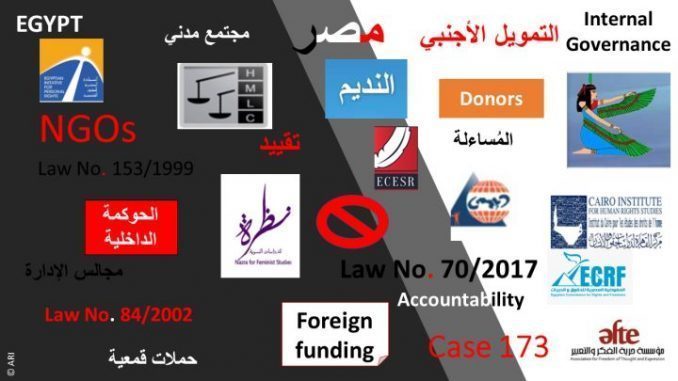
Egypt’s social solidarity minister has warned that the government won’t extend the registration deadline for local & foreign NGOs, meaning that any NGO that fails to register under the current repressive law within the next week could be dissolved.
Egyptian Minister of Social Solidarity Nevine al-Kabbaj two days ago warned that the government will not extend the registration deadline for local and foreign NGOs operating in Egypt. This only means that any that fail to register under the repressive NGO law within the next week could face dissolution.
Last month, 20 non-governmental organizations sent a letter to US Secretary of State Antony Blinken to voice concern about the April 11 deadline.
“Registration and further implementation of this law will further erode civic space in Egypt, and we fear its detrimental impact given that human rights defenders and government critics in Egypt are already operating in a landscape of systemic repression,” they wrote.
“The U.S. government should swiftly urge the Egyptian authorities to withdraw this registration deadline until it amends the NGO law and its bylaws by removing the undue restrictions it imposes on freedom of association and expression in Egypt.”
Al-Kabbaj on 5 April stressed, however, that authorities will not extend the deadline again. She urged organizations to “speed up their situation before April 12” or otherwise be referred to the judiciary for dissolution.
The minister said that 35,653 organizations of various types have submitted requests to register under the law so far. But even if all of those were accepted, it would leave tens of thousands more with unclear statuses.
The Arabic Network for Human Rights Information was forced to shut down last year after facing “an almost impossible difficulty” in registering under the law.
UN human rights experts have voiced grave concern that the law is in violation of human rights norms and severely undermines the ability of civil society to operate independently.
Absence of transparency
On the other hand, Egyptian prosecutors have again refused to reopen an investigation into economist Ayman Hadhoud’s suspicious death in a psychiatric facility last year, the Association for Freedom of Thought and Expression (AFTE) revealed this week.
After Hadhoud’s enforced disappearance and death in state custody one year ago, the State Department said that it was “deeply disturbed” and called for a “thorough, transparent, and credible” investigation.
Yet prosecutors ultimately decided that there was no reason to file a criminal complaint over the case, and a court rejected his family’s subsequent appeal.
Egyptian and international rights groups rued the missed opportunity for justice at the time.
“The prosecutors who investigated his death ignored mounting evidence that the authorities forcibly disappeared, tortured, and otherwise ill-treated him, and denied him access to timely and adequate health care,” Human Rights Watch and Amnesty International stated.
The AFTE made a renewed push for accountability last month when it filed a request on behalf of Hadhoud’s brother.
The complaint demanded that the Public Prosecution reopen the investigation due to the many remaining questions in authorities’ account, such as why hospital officials hid Hadhoud’s body for more than one month. The court, however, again dismissed the case on 2 April 2023.



